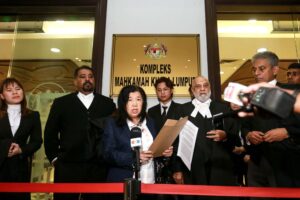KUALA LUMPUR, Nov 6 — In a scathing commentary that went beyond his landmark rulings yesterday, High Court judge Su Tiang Joo delivered a harsh critique of state accountability, lamenting the irony of using public funds to compensate for the wrongdoings of government servants.
His remarks came as he ordered the government to pay nearly RM37 million to the family of Pastor Raymond Koh for enforced disappearance and over RM3 million to that of activist Amri Che Mat for negligence in a police investigation.
Su ordered compensation of RM10,000 per day from the day Koh went missing until he is found — an amount that currently exceeds RM31 million — to be placed in a trust fund until his fate is ascertained. Koh has been missing for a total of 3,187 days as of November 5.
“The RM10,000 is not a figure I plucked from the air. It was a figure that was given by the Court of Appeal involving false imprisonment at RM10,000 per day as given for deprivation of personal liberty under the Federal Constitution,” he said in justifying the sum.
However, the judge acknowledged the irony in awarding such large sums, noting that the higher the damages, the more public funds would ultimately be used to pay for the wrongdoings of government servants.
“It offends the concept of fairness, reasonableness and justice,” he said.
He then quoted former British Prime Minister Margaret Thatcher’s 1983 speech at the Conservative Party Conference to illustrate his point.
“Let us never forget this fundamental truth, the State has no source of money other than money which people earn themselves.
“If the State wishes to spend more it can do so only by borrowing your savings or by taxing you more.
“It is no good thinking that someone else will pay ― that ‘someone else’ is you. There is no such thing as public money; there is only taxpayers’ money,” he quoted.
Su also cited the case of Mongolian interpreter Altantuya Shaariibuu, who was murdered by two Royal Malaysia Police officers, noting how the Shah Alam High Court had found both the officers and the Malaysian government vicariously liable for her death in 2022.
The court had ordered the defendants in that case to pay RM5 million in damages, with the case currently pending appeal at the Court of Appeal.
He said the same principle applied to Koh’s and Amri’s cases — that the higher the award, the more public funds would be used — and called it a bitter irony.
“It would probably distress the sense of justice of the man on the street that he will be contributing towards the payment of damages awarded to be paid by the very person entrusted to protect him and who have been found liable for abusing such power,” he added.
Amri was abducted in Perlis around midnight on November 24, 2016, when his vehicle was surrounded by three cars and five men.
Koh was abducted on February 13, 2017, in Selangor after his car was surrounded by seven vehicles and about 15 masked individuals.
In April 2019, the Human Rights Commission of Malaysia (Suhakam) concluded that both men were victims of enforced disappearance carried out by the police’s Special Branch.




